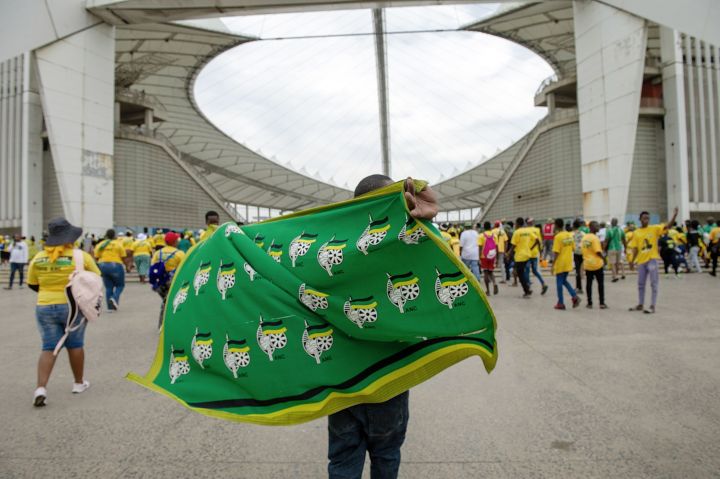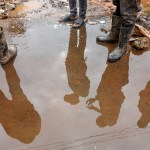Newsdeck
ANC Support Drops in South African Poll as Zuma Party Surges

Support for South Africa’s ruling African National Congress is plunging and a party backed by former President Jacob Zuma may become the country’s third-biggest after next month’s election, a new opinion poll shows. The rand weakened.
Such a result may mean the ANC has to form a coalition with a large rival to retain control of Africa’s most industrialized economy and have to make concessions on policies and appointments. The ruling party may also force President Cyril Ramaphosa from office before he completes another five-year term — a prospect that has caused angst among investors. South Africa’s leader is elected by the National Assembly, which also has the power to dismiss him.
The rand fell as much as 1.9% against the dollar on news of the poll findings, and traded 1.7% lower at 18.7648 by 5:13 p.m. in Johannesburg.
Read more: Rand Plunges as Poll Shows Zuma Eating Into ANC’s Support
The SRF stressed that the poll doesn’t constitute a forecast of the election outcome, and that support for the MKP — which launched in December — still needs to settle.
“A lot can still change before May 29,” said Frans Cronje, the head of the SRF. The ANC may get a “late-stage surge” that may add two to three percentage points to its tally, he said.
Zuma ruled the country from 2009 to 2018, when the ANC forced him from office after a series of corruption scandals started to erode electoral support. While his decision to back the MKP has hurt the ANC, particularly in his home province of KwaZulu-Natal, the ruling party has been drawing big crowds to its election rallies and has a campaigning machinery that dwarfs that of all of its rivals.
Methodology Questioned
Steven Friedman, a politics professor at the University of Johannesburg, questioned the methodology used in polls that indicate support for the ANC has fallen below 40%, saying they don’t take into account those people who refused to express an opinion or didn’t intend to vote. The SRF said it excludes those people from its surveys.
“I track municipal by-elections, which is real people casting real votes,” and they show ANC support in the mid-to-high 40% range, Friedman said. “There are so many things that can distort poll outcomes.”
The SRF poll of 1,835 registered voters across the country also found that the main opposition Democratic Alliance would win 25% of vote, the Economic Freedom Fighters 11% and the Inkatha Freedom Party 5%. The Freedom Front Plus, African Christian Democratic Party and Action South Africa would both get 2%, it showed.
As recently as mid-January, before it carried out its surveys, the SRF had predicted that the MKP would get just 1% to 2% of the national vote.
Corruption Scandals
The results of the survey are another indicator of the ANC’s decline amid corruption scandals, severe power outages, rampant crime and the collapse of basic services such as water provision.
The poll was based on an estimated turnout of 66% and has a 2.2% margin of error.
Provincial surveys, also released by the SRF on Wednesday, showed the ANC would match the DA with 31% of the vote in Gauteng, the most-populous and richest region. In the Western Cape, the DA would remain the biggest party with 54% backing, compared with 20% for the ANC, while MKP would be the largest party in KwaZulu-Natal at 26%.
MKP would derive the bulk of its national support in KwaZulu-Natal and Gauteng, the surveys showed.
The SRF, a public-policy organization, was founded in 2021. Cronje, a former chief executive officer of the Institute of Race Relations, has consulted for South Africa’s biggest political parties, companies and richest people.



















 Become an Insider
Become an Insider
ANC + MKP = 50%. If that’s how the actual vote goes, there are two 2-party options to get to 50%: ANC + MKP and ANC + DA.
I wonder if Malema is rueing cozying up to Zuma when he fell out with the ANC, as MKP seems to have taken support from EFF.
Even more scary.
ANC / MK / EFF. When Ramaphosa is ousted and Mashatile takes over.
It makes a DA / Ramaphosa’s ANC suddenly look great.
“Cronje, a former chief executive officer of the Institute of Race Relations, has consulted for South Africa’s biggest political parties, companies and richest people.” One assumes that the author of the article wanted to make a point with the quoted statement above.
What would be the point?
Especially since we do not know who are these “biggest political parties”
Who are these companies and ‘richest people’…
Most importantly, what is their worldview?